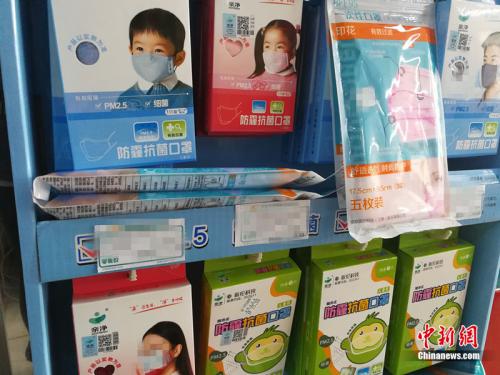


Sales of masks, air purifiers, and other anti-smog products decreased dramatically this winter because of frequent blue skies in Beijing, Tianjin, Hebei, and surrounding areas, chinanews.com reported on Wednesday.
Green Shield, 3M, and other producers of anti-smog masks are seeing a drop in sales not only at physical stores, but also online.
At the end of 2016, hundreds of anti-smog masks were sold every day, said a worker at a Beijing drug store. But this winter, fewer customers came to buy masks and only two companies ordered two batches for their employees.
A similar phenomenon happened on e-commerce sites like Tmall and Jingdong (JD).
At the end of 2016, Beijing was encompassed in heavy smog, which significantly boosted sales of masks, purifiers, and PM2.5 detectors. According to the 2016 sales data released Chinese e-commerce giant JD, 15 million masks were sold in just the five days from December 16 to 20, 2016, an increase of 380 percent from the previous year; and 110 thousand air purifiers were sold, with a growth rate of over 210 percent. PM2.5 detectors’ sales also experienced a 105 percent increase in 2016.
No data has been released about the sales volume of anti-smog products in 2017 and the homepages of these e-commerce giants list fewer introductions of air purifiers.
People are pleased to see the improved air quality in Beijing, Tianjin, and surrounding areas this winter. The PM2.5 concentration of these areas in November dropped by 37 percent compared with that in 2016, according to data from Ministry of Environmental Protection. But this is not good news for those who want to make fortune by selling masks in smoggy winter days.
The sales of masks for consumers declined by a half this year, said Cheng Xiqing, the marketing manager of a purchasing company in south China’s Guangdong province. Some enterprises spent millions of yuan buying anti-smog masks last summer, but the supply is in excess of demand this winter and no purchaser is willing to buy the overstocked masks even at a discount rate of 20% based on the cost price.
Honeywell and 3M occupied the largest market shares in China regarding its sales of masks for consumers. The two companies refused to reveal any sales numbers or make any comments. They both noted that anti-smog masks are only a small part of their businesses.
Cheng showed less optimism to the future market of anti-smog masks. But Liang Zhenpeng, a household appliance industry analyst, believes that there is still space for sales of air purifiers in China.
Northern China’s air quality has been greatly improved, but more efforts are still needed to turn the sky in other places clear and blue. Only one percent of families in China own air purifiers, which is far lower than the ownership rates in the United States (27 percent) and Japan (17 percent), according to an investment analysis and demand projection report on the air purifiers industry.
More families in China will buy a household air purifier in the future, said Liang.
 Fire brigade in Shanghai holds group wedding
Fire brigade in Shanghai holds group wedding Tourists enjoy ice sculptures in Datan Town, north China
Tourists enjoy ice sculptures in Datan Town, north China Sunset scenery of Dayan Pagoda in Xi'an
Sunset scenery of Dayan Pagoda in Xi'an Tourists have fun at scenic spot in Nanlong Town, NW China
Tourists have fun at scenic spot in Nanlong Town, NW China Harbin attracts tourists by making best use of ice in winter
Harbin attracts tourists by making best use of ice in winter In pics: FIS Alpine Ski Women's World Cup Slalom
In pics: FIS Alpine Ski Women's World Cup Slalom Black-necked cranes rest at reservoir in Lhunzhub County, Lhasa
Black-necked cranes rest at reservoir in Lhunzhub County, Lhasa China's FAST telescope will be available to foreign scientists in April
China's FAST telescope will be available to foreign scientists in April "She power" plays indispensable role in poverty alleviation
"She power" plays indispensable role in poverty alleviation Top 10 world news events of People's Daily in 2020
Top 10 world news events of People's Daily in 2020 Top 10 China news events of People's Daily in 2020
Top 10 China news events of People's Daily in 2020 Top 10 media buzzwords of 2020
Top 10 media buzzwords of 2020 Year-ender:10 major tourism stories of 2020
Year-ender:10 major tourism stories of 2020 No interference in Venezuelan issues
No interference in Venezuelan issues
 Biz prepares for trade spat
Biz prepares for trade spat
 Broadcasting Continent
Broadcasting Continent Australia wins Chinese CEOs as US loses
Australia wins Chinese CEOs as US loses